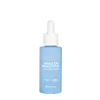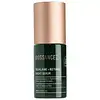What's inside
What's inside
 Key Ingredients
Key Ingredients

 Benefits
Benefits

 Concerns
Concerns

 Ingredients Side-by-side
Ingredients Side-by-side

Water
Skin ConditioningPropanediol
SolventHelianthus Annuus Seed Oil
EmollientCetearyl Olivate
Sorbitan Olivate
EmulsifyingHydroxypinacolone Retinoate
Skin ConditioningRosa Centifolia Flower Extract
AstringentCalendula Officinalis Flower Extract
MaskingChamomilla Recutita Flower Extract
MaskingGanoderma Lucidum Extract
Skin ProtectingTrametes Versicolor Extract
Chenopodium Quinoa Seed Extract
Skin ConditioningMelatonin
AntioxidantOryza Sativa Bran Extract
Skin ConditioningHelianthus Annuus Extract
EmollientRosmarinus Officinalis Leaf Extract
AntimicrobialTocopherol
AntioxidantGlycerin
HumectantLinoleic Acid
CleansingPhytosterols
Skin ConditioningPhospholipids
Skin ConditioningJojoba Esters
EmollientCaprylic/Capric Triglyceride
MaskingSodium Hyaluronate
HumectantXanthan Gum
EmulsifyingAcacia Senegal Gum
MaskingSodium Gluconate
Skin ConditioningDimethyl Isosorbide
SolventMethylheptylglycerin
HumectantCaprylhydroxamic Acid
Caprylyl Glycol
EmollientCitric Acid
BufferingWater, Propanediol, Helianthus Annuus Seed Oil, Cetearyl Olivate, Sorbitan Olivate, Hydroxypinacolone Retinoate, Rosa Centifolia Flower Extract, Calendula Officinalis Flower Extract, Chamomilla Recutita Flower Extract, Ganoderma Lucidum Extract, Trametes Versicolor Extract, Chenopodium Quinoa Seed Extract, Melatonin, Oryza Sativa Bran Extract, Helianthus Annuus Extract, Rosmarinus Officinalis Leaf Extract, Tocopherol, Glycerin, Linoleic Acid, Phytosterols, Phospholipids, Jojoba Esters, Caprylic/Capric Triglyceride, Sodium Hyaluronate, Xanthan Gum, Acacia Senegal Gum, Sodium Gluconate, Dimethyl Isosorbide, Methylheptylglycerin, Caprylhydroxamic Acid, Caprylyl Glycol, Citric Acid
Water
Skin ConditioningSqualane
EmollientGlycerin
HumectantCaprylic/Capric Triglyceride
MaskingCetearyl Olivate
Sorbitan Olivate
EmulsifyingRetinol
Skin ConditioningRetinal
Skin ConditioningAllantoin
Skin ConditioningCrocus Sativus Stigma Extract
Pseudozyma Epicola/Evening Primrose Oil Ferment Extract
EmollientTocopherol
AntioxidantRosmarinus Officinalis Leaf Extract
AntimicrobialOryza Sativa Bran Extract
Skin ConditioningCetearyl Alcohol
EmollientHelianthus Annuus Extract
EmollientHydroxyapatite
AbrasiveDextrin
AbsorbentCarbomer
Emulsion StabilisingSodium Gluconate
Skin ConditioningPhenoxyethanol
PreservativeEthylhexylglycerin
Skin ConditioningSodium Hydroxide
BufferingWater, Squalane, Glycerin, Caprylic/Capric Triglyceride, Cetearyl Olivate, Sorbitan Olivate, Retinol, Retinal, Allantoin, Crocus Sativus Stigma Extract, Pseudozyma Epicola/Evening Primrose Oil Ferment Extract, Tocopherol, Rosmarinus Officinalis Leaf Extract, Oryza Sativa Bran Extract, Cetearyl Alcohol, Helianthus Annuus Extract, Hydroxyapatite, Dextrin, Carbomer, Sodium Gluconate, Phenoxyethanol, Ethylhexylglycerin, Sodium Hydroxide
 Reviews
Reviews

Ingredients Explained
These ingredients are found in both products.
Ingredients higher up in an ingredient list are typically present in a larger amount.
This ingredient is an emollient, solvent, and texture enhancer. It is considered a skin-softener by helping the skin prevent moisture loss.
It helps thicken a product's formula and makes it easier to spread by dissolving clumping compounds.
Caprylic Triglyceride is made by combining glycerin with coconut oil, forming a clear liquid.
While there is an assumption Caprylic Triglyceride can clog pores due to it being derived from coconut oil, there is no research supporting this.
Learn more about Caprylic/Capric TriglycerideCetearyl Olivate is an emulsifier and texture enhancer. It is derived from the fatty acids of olive oil and Cetearyl alcohol, and is biodegradable.
As an emulsifier, it is used to prevent oils and waters from separating. It can also
Manufacturers use the name Olivem 1000. This ingredient has been found to preserve the natural microbiome of skin. Having a healthy microbiome helps keep our skin healthy and protects against harmful bacteria. This ingredient is grouped with Sorbitan Olivate under the name Olivem 1000.
Learn more about Cetearyl OlivateGlycerin is already naturally found in your skin. It helps moisturize and protect your skin.
A study from 2016 found glycerin to be more effective as a humectant than AHAs and hyaluronic acid.
As a humectant, it helps the skin stay hydrated by pulling moisture to your skin. The low molecular weight of glycerin allows it to pull moisture into the deeper layers of your skin.
Hydrated skin improves your skin barrier; Your skin barrier helps protect against irritants and bacteria.
Glycerin has also been found to have antimicrobial and antiviral properties. Due to these properties, glycerin is often used in wound and burn treatments.
In cosmetics, glycerin is usually derived from plants such as soybean or palm. However, it can also be sourced from animals, such as tallow or animal fat.
This ingredient is organic, colorless, odorless, and non-toxic.
Glycerin is the name for this ingredient in American English. British English uses Glycerol/Glycerine.
Learn more about GlycerinHelianthus Annuus Extract comes from the common sunflower.
Sunflowers are rich in vitamin E. Studies show sunflowers contain antimicrobial and antioxidant properties.
The fatty acids found in sunflowers include (from highest amount to least): linoleic acid, myristic acid, palmitic acid, stearic acid, arachidic acid, oleic acid, and linolenic acid.
These fatty acids hydrate your skin. Emollients create a film on the skin to prevent moisture from escaping.
Learn more about Helianthus Annuus ExtractOryza Sativa Bran Extract comes from the outer layer of a rice kernel. It is a byproduct of milling rice, or the operation to produce a whole grain rice product.
This ingredient has moisturizing properties due to its components of polysaccharides and omega-3 fatty acids. It also contains calcium, selenium, phosphorus, iron, and zinc.
Oryza Sativa Bran Extract contains numerous antioxidants such as ferulic acid. Antioxidants help fight free-radical molecules. Free-radical molecules are capable of damaging our cells and other genetic material.
Learn more about Oryza Sativa Bran ExtractRosmarinus Officinalis Leaf Extract comes from rosemary. Rosemary is native to the Mediterranean.
While Rosmarinus Officinalis Leaf Oil can be volatile due to its fragrant properties, the fragrance components are usually removed in the leaf extract.
Rosemary Leaf Extract contains many antioxidants such as rosmarinic acid and caffeic acid. Rosemarinic acid, a compound found in rosemary leaf, has been found to help soothe skin conditions such as eczema and acne.
Learn more about Rosmarinus Officinalis Leaf ExtractThis is the synthetic salt of gluconic acid, a form of PHA and mild exfoliant.
It is mainly used to stabilize oil and butter formulations from going bad. Sodium gluconate is a humectant, pH regulator, and chelating agent.
Chelating agents help neutralize unwanted metals from affecting the formulation.
Sodium gluconate is water-soluble.
Learn more about Sodium GluconateSorbitan Olivate is created from the fatty acids in olive oil and sorbitol.
This ingredient is an oil in water emulsifier. It helps stabilize a product by preventing oils and waters from separating. Sorbitan Olivate also helps hydrate the skin.
Manufacturers sell sorbitan olivate under the name OliveM 1000. OliveM 1000 a multifunctional ingredient. It is self-emulsifying. According to a manufacturer, OliveM 1000 does not disrupt natural skin biome.
Due to its olive oil base, this ingredient may not be fungal-acne safe.
Learn more about Sorbitan OlivateTocopherol (also known as Vitamin E) is a common antioxidant used to help protect the skin from free-radicals and strengthen the skin barrier. It's also fat soluble - this means our skin is great at absorbing it.
Vitamin E also helps keep your natural skin lipids healthy. Your lipid skin barrier naturally consists of lipids, ceramides, and fatty acids. Vitamin E offers extra protection for your skin’s lipid barrier, keeping your skin healthy and nourished.
Another benefit is a bit of UV protection. Vitamin E helps reduce the damage caused by UVB rays. (It should not replace your sunscreen). Combining it with Vitamin C can decrease sunburned cells and hyperpigmentation after UV exposure.
You might have noticed Vitamin E + C often paired together. This is because it is great at stabilizing Vitamin C. Using the two together helps increase the effectiveness of both ingredients.
There are often claims that Vitamin E can reduce/prevent scarring, but these claims haven't been confirmed by scientific research.
Learn more about TocopherolWater. It's the most common cosmetic ingredient of all. You'll usually see it at the top of ingredient lists, meaning that it makes up the largest part of the product.
So why is it so popular? Water most often acts as a solvent - this means that it helps dissolve other ingredients into the formulation.
You'll also recognize water as that liquid we all need to stay alive. If you see this, drink a glass of water. Stay hydrated!
Learn more about Water